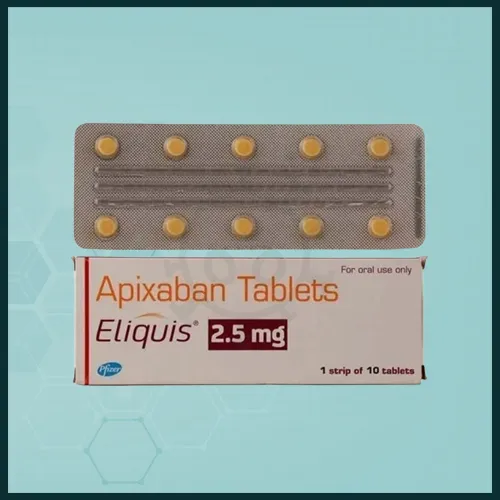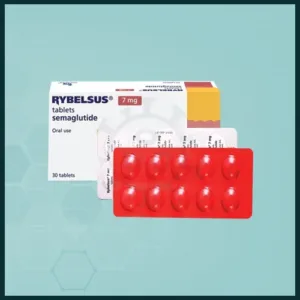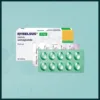What is Eliquis 2.5 mg?
Eliquis 2.5 mg is a prescription medication that contains Apixaban, an oral anticoagulant (blood thinner). It belongs to a class of drugs called direct oral anticoagulants (DOACs) and is used to prevent and treat blood clots in various medical conditions.
Eliquis is commonly prescribed for:
-
Preventing stroke and systemic embolism in patients with non-valvular atrial fibrillation (AFib)
-
Preventing deep vein thrombosis (DVT) and pulmonary embolism (PE) after hip or knee replacement surgery
-
Treatment and prevention of recurrent DVT or PE
Eliquis 2.5 mg is a lower strength dose, often used for long-term prevention or in patients with specific risk factors such as advanced age or kidney impairment.
How Does Eliquis Work?
Eliquis works by inhibiting Factor Xa, a crucial enzyme in the blood clotting cascade. When Factor Xa is blocked, the formation of thrombin (another clotting enzyme) is reduced, which prevents the development of harmful blood clots in veins, arteries, or the heart.
Unlike older anticoagulants like warfarin, Eliquis acts directly and does not require routine blood monitoring or frequent dose adjustments. It has a predictable anticoagulant effect and fewer dietary restrictions, making it more convenient for long-term use.
Benefits of Eliquis 2.5 mg
-
Reduces stroke risk in AFib patients – Eliquis significantly lowers the risk of stroke compared to no treatment or some older anticoagulants.
-
Prevents blood clots after surgery – Effective at reducing DVT/PE risk after orthopedic surgeries.
-
Treats existing clots – Used in combination with Eliquis 5 mg to treat DVT or PE, then stepped down to 2.5 mg for long-term prevention.
-
Fewer food and drug interactions – Compared to warfarin, Eliquis is less affected by diet and other medications.
-
No regular INR monitoring needed – Offers convenience and stable dosing.
-
Well-tolerated – Lower risk of major bleeding in some patients, based on clinical trial data.
How to Take Eliquis 2.5 mg?
Eliquis 2.5 mg should be taken exactly as prescribed by your healthcare provider. General guidelines include:
-
Dosage: Usually taken twice daily (every 12 hours), with or without food.
-
Swallow whole: Do not crush or split the tablet.
-
Missed dose: If a dose is missed, take it as soon as possible on the same day. Do not double up doses.
-
Duration: Treatment duration varies depending on the condition. Some patients take it short-term (e.g., after surgery), while others may need long-term use.
Never stop Eliquis without consulting your doctor, as it can increase the risk of serious blood clots.
Who Makes Eliquis?
Eliquis is manufactured by Bristol-Myers Squibb in partnership with Pfizer. These are two globally recognized pharmaceutical companies known for their extensive research, development, and production of life-saving medicines.
The drug has been approved and marketed in numerous countries and is FDA-approved in the United States as well as approved by the European Medicines Agency (EMA) and other health authorities worldwide.
Is Eliquis Safe for Humans?
Yes, Eliquis is considered safe and effective for most people when used correctly and under medical supervision. It has undergone extensive clinical trials and is widely prescribed globally.
However, safety depends on the individual’s medical history and current health status. Caution is needed in:
-
People with active bleeding or bleeding disorders
-
Those with severe liver or kidney disease
-
Patients with mechanical heart valves (not recommended)
-
Pregnant or breastfeeding women (only if benefits outweigh risks)
Eliquis is not for use in conditions requiring rapid reversal of anticoagulation, as its effects, although reversible, are not immediate without specific reversal agents like andexanet alfa.
Side Effects of Eliquis
Like any medication, Eliquis can cause side effects, though not everyone experiences them.
Common side effects include:
-
Easy bruising
-
Minor bleeding (gums, nosebleeds)
-
Nausea
-
Fatigue
Serious but rare side effects:
-
Major bleeding (e.g., gastrointestinal or brain bleeding)
-
Allergic reactions (rash, itching, swelling)
-
Liver enzyme elevation
Signs of serious complications that require immediate medical attention:
-
Prolonged bleeding from cuts
-
Blood in urine or stool
-
Unusual headaches, dizziness, or weakness
-
Coughing or vomiting blood
Inform your doctor if you’re taking other medications, especially NSAIDs, antiplatelets, or other anticoagulants, as these can increase the risk of bleeding.
Disclaimer
This article is for educational and informational purposes only and should not replace professional medical advice. Always consult a licensed healthcare provider before starting or stopping Eliquis or any other medication. Dosage, risks, and benefits vary from person to person. The use of Eliquis should be based on an individual assessment by a qualified physician.







Reviews
There are no reviews yet.